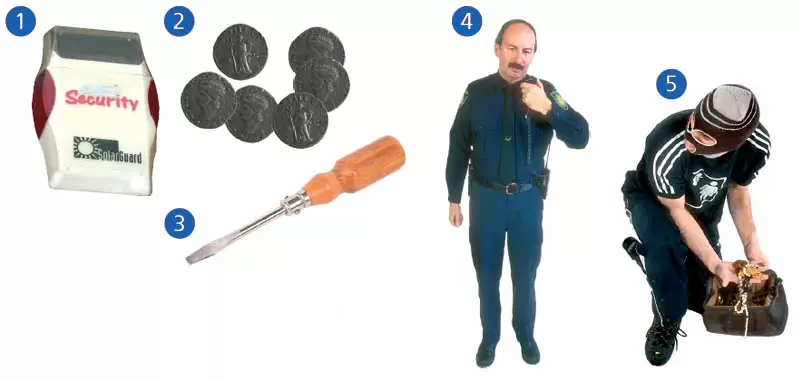Nesta aula do nosso curso online de inglês, você aprenderá a falar sobre eventos que já ocorreram, usando a voz passiva no passado.
1 . Você já teve de registrar um roubo? Ou dar um depoimento à polícia sobre um crime? Associe as imagens às palavras do quadro.
thief | alarm | screwdriver | security guard | Roman coins

Grammar: Past passive
Quando um evento ocorreu no passado e queremos nos concentrar na ação e não na pessoa que a realizou, usamos a voz passiva no passado. A passiva no passado é formada por was / were + verbo no particípio passado.
A thief robbed the museum at the weekend. (ativa)
The museum was robbed at the weekend. (passiva)
Às vezes, quando usamos a voz passiva, queremos dizer quem realizou a ação.
William Shakespeare wrote Romeo and Juliet.
Romeo and Juliet was written by William Shakespeare.
2 . Alguém invadiu o museu durante o fim de semana. Ouça o diálogo entre o diretor do museu e um policial. Em seguida, escolha a alternativa correta para formar frases verdadeiras sobre o que aconteceu.
1 The thief got in through a door / window.
2 He cut the telephone lines / alarm.
3 He surprised the museum / security guard.
4 He tied the guard to a chair / glass case.
5 He stole a letter / some coins.
6 He left a note / some money.
3 . Complete este depoimento sobre um crime com a voz passiva usando was ou were e as palavras do quadro abaixo.
taken | stolen | broken | opened | used | left | tied | cut | called
We are sorry that you have been a victim of crime in the area. In order to help us deal effectively with this incident, please tell us in your own words, and in as much detail as possible, what happened.
The incident took place at about midnight on Sunday 14 May. One of the windows at the back of the building (1) ……………………. , so we guessed the thief got in there. The telephone lines (2) …………………………., probably by the same person. The security guard (3) ……………………. to a chair so he couldn’t escape. Then a glass case (4) …………………. . We found a screwdriver on the floor, so we think it (5) ……………………….. to open the case. Some ancient Roman coins (6) ………………………… and a note (7) ……………………. on the case. When we found the security guard the next morning, the police and an ambulance (8) …………………….. and the guard (9) ………………. to hospital.
4 . Escreva as frases a seguir na voz passiva.
1 William Shakespeare wrote Romeo and Juliet.
Romeo and Juliet ………………………………………………………
2 Picasso painted Guernica in 1937.
Guernica ……………………………………………………
3 Marie Curie discovered radium.
Radium ……………………………………………………
4 Nelson Mandela won the Nobel Peace Prize in 1993.
The Nobel Peace Prize ………………………………………
Word Bank
alarm (substantivo) = alarme
ancient (adjetivo) = antigo
crime (substantivo) = crime
incident (substantivo) = incidente
metropolitan (adjetivo) = metropolitano
Nobel Prize (substantivo) = Prêmio Nobel
paint (verbo) = pintar (quadros)
paramedic (substantivo) = paramédico
radium (substantivo) = rádio (elemento químico)
record (verbo) = gravar
screwdriver (substantivo) = chave de fenda
security guard (substantivo) = segurança (profissional)
tie (verbo) = amarrar
victim (substantivo) = vítima
Respostas:
Exercício 1
1 alarm
2 Roman coins
3 screwdriver
4 security guard
5 thief
Exercício 2
1 window
2 telephone lines
3 security guard
4 chair
5 some coins
6 a note
Exercício 3
1 was broken
2 were cut
3 was tied
4 was opened
5 was used
6 were stolen
7 was left
8 were called
9 was taken
Exercício 4
1 Romeo and Juliet was written by William Shakespeare.
2 Guernica was painted by Picasso in 1937.
3 Radium was discovered by Marie Curie.
4 The Nobel Peace Prize was won by Nelson Mandela in 1993.
 Sair da aula
Sair da aula